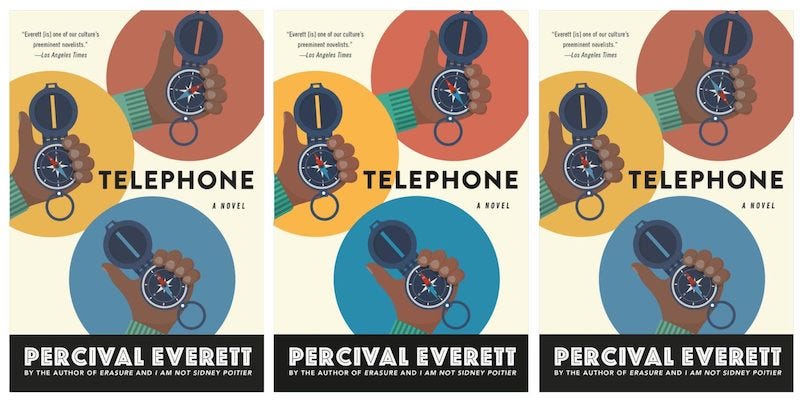I always wanted to see through her eyes, to see her world. I imagined, realized, that if I could think like her, have my mind open like hers, so much of the world would be that much more available, magical, mysterious to me. I would be a better scientist, a better person, a better father.
That quote reveals what we need to know to understand the protagonist/narrator of another unique and wholly engaging novel by Percival Everett. Having read Trees, reviewed here last year, I went back to the his expansive backlist and this stands-out.
I’m told the novel has three different endings, which is only noted by a number on the title page. I cannot say how the endings differ, and of course I’m curious, but my ending made sense. No small feat in a story about all that does not make sense.
Telephone follows a geologist/paleobiologist professor [with a specialty in cave archeology] struggling with his only child’s diagnosis of a rare deteriorating disease. He is also steeped in a waning marriage, while also grappling with student and faculty drama. How to manage profound sadness, and fear, and the machinations of academia, not to mention a marriage trapped in inertia is at the heart of the novel, revealing various strands of misunderstandings, akin to the childhood game of telephone, in which a message is whispered from person to person with increasingly diminished comprehension. A perfect metaphor.
I thought of how we take for granted that the space of the world and the time in which that space exists and in which our immediate experience is located are really the only space and time that matter. Yet somehow I believed, like all others, that moments are casually connected, tied together and moving influence in only one direction.
The professor is as much philosopher as scientist, the existential shifting to the forefront when he realizes that all he thought he could count on is slipping from his grip. The inability, or unwillingness to accept his daughter’s destiny demands an entirely new paradigm of understanding. Acceptance may be antithetical to an academic grounded in inquiry.
For no reason, other than the way we have of doing things to distract us from despair, he orders a jacket from eBay and finds a note hidden in the pocket asking for help: Ayudarme. Might be a joke from a bored stock clerk or might be a plea for a savior. Like the geologist he is, he’s drawn to the discovery, as if striations in rock. And, perhaps, he can save someone, if not his daughter.
The way we treat each other changes at a pace that in all other arenas of human experience we would find intolerable. We might call the pace slow or unhurried or, most accurately, glacial. A glacier is a body of ice and firn that shows evidence of movement, occurring where the production of snow is greater than ablation and so, continues from year to year, persisting even when a change in climate reverses the conditions that have allowed it to exist. So it is with indecency, harm, and evil, we inflict on each other, prejudice, neglect, torture, and slavery. Like glaciers, they are not unique to any one part of Earth. Like ice, it is both mineral and rock.
We follow as he attempts to explain the inexplicable, called upon to make sense of the cognitive decline of a beloved twelve year-old, the possible rescue of an unknown human asking for help, strange surrealistic dreams, inequity in academia, and the exacerbated strain on his marriage. As if all synapses are disconnecting at once.
As I fell asleep, I knew I would dream, and I dreamed first that I knew why I dreamed, why humans dream… We dream, quite simply, so we know we’re not dead.
Along the way, Everett spatters the narrative with geological notation and philosophical ramblings, as if a subconscious effort to fathom the most profound questions of existence while failing to make sense of his own.
When rednecks get scared, they run to their guns. When intellectuals get scared, they run to fundamental philosophical problems: What is goodness? What is beauty? What it is to know a thing?
The secondary plot line of the plea for help, and the people he encounters on that path, might have been a novel unto itself, but serves beautifully as counterpoint to his deeper troubles, and in this way, Everett has presented a character on a powerful journey, not as much for reclamation or salvation, but understanding.
Highly recommended reading for those who cherish stories where the ends justify the means, even if not quite a happy ending, whichever ending you read.





